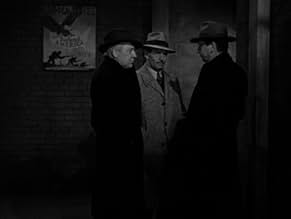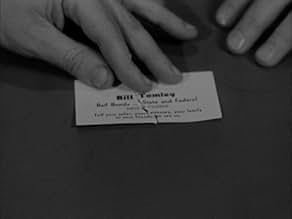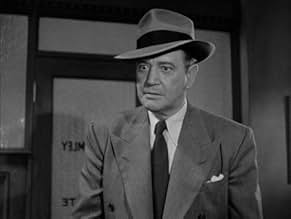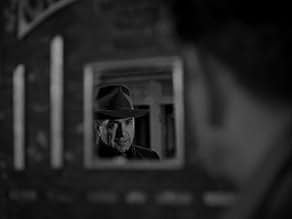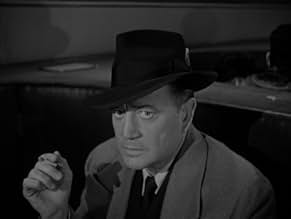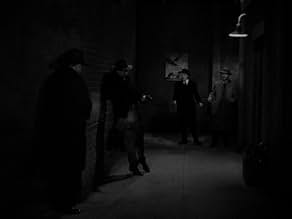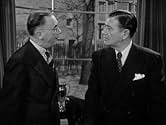AVALIAÇÃO DA IMDb
6,3/10
1,3 mil
SUA AVALIAÇÃO
Adicionar um enredo no seu idiomaA depressed man hires an assassin to kill him when he least expects it, but when his life takes an upward turn, he finds he now wishes to live.A depressed man hires an assassin to kill him when he least expects it, but when his life takes an upward turn, he finds he now wishes to live.A depressed man hires an assassin to kill him when he least expects it, but when his life takes an upward turn, he finds he now wishes to live.
- Direção
- Roteiristas
- Artistas
Trevor Bardette
- The Bum in the Next Bed
- (não creditado)
William 'Billy' Benedict
- The Deafmute
- (não creditado)
Willie Bloom
- Bum
- (não creditado)
Roy Brent
- Detective in Alley
- (não creditado)
Charles Coleman
- Jennings the Butler
- (não creditado)
Clancy Cooper
- Telephone Repairman
- (não creditado)
Don Costello
- Lefty Vigran aka Gorss
- (não creditado)
Russell Custer
- Bar Patron
- (não creditado)
Ralph Dunn
- Cop at Car Accident
- (não creditado)
Otto Forrest
- The Whistler
- (não creditado)
Byron Foulger
- Flophouse Desk Clerk
- (não creditado)
John George
- Bum
- (não creditado)
Dick Gordon
- Tomley's Assistant
- (não creditado)
Robert Homans
- Dock Watchman
- (não creditado)
- Direção
- Roteiristas
- Elenco e equipe completos
- Produção, bilheteria e muito mais no IMDbPro
Avaliações em destaque
Fans of the radio series will not be dissapointed by this little gem of a thriller. Richard Dix gives a great performance as a man who puts a contract out on his own life. He is upset because he has not gotten over his wife drowning in the Pacific Ocean on a vacation three years ago. He then gets a wire saying his wife is alive, will be home soon, and now has to hurry and stop the contract. The only thing this was missing that was common in the radio play was a suprise ending. Very often in the radio series, it was never a question of whodunit, as it was often told through the killer's point of view, but it was how they were going to trip themselves up or get caught. And it was always with a twist.
Whistler, The (1944)
** 1/2 (out of 4)
First film in Columbia's series has Richard Dix playing a man wanting to commit suicide due to the death of his wife but he doesn't have the courage to do so. Wanting to die, Dix hires a killer (J. Carrol Naish) to do the job but then he learns that his wife is still alive so he too must try and stay alive. Based on a radio show, this first film is actually pretty entertaining due to some nice direction by Castle and the two leads turning in fine performances. The story itself is pretty interesting and the B-budget gets all out of it that it can. Dix makes for a very good leading man and his performance is very good especially during his depression scenes. Naish is a great character actor and makes for a very good killer. Gloria Stuart plays Dix secretary and does nice work, although she has the weakest character.
** 1/2 (out of 4)
First film in Columbia's series has Richard Dix playing a man wanting to commit suicide due to the death of his wife but he doesn't have the courage to do so. Wanting to die, Dix hires a killer (J. Carrol Naish) to do the job but then he learns that his wife is still alive so he too must try and stay alive. Based on a radio show, this first film is actually pretty entertaining due to some nice direction by Castle and the two leads turning in fine performances. The story itself is pretty interesting and the B-budget gets all out of it that it can. Dix makes for a very good leading man and his performance is very good especially during his depression scenes. Naish is a great character actor and makes for a very good killer. Gloria Stuart plays Dix secretary and does nice work, although she has the weakest character.
This movie is the first installment of The Whistler series from Columbia Pictures, all but one of which starred Richard Dix whose A-picture career was then on an alcoholic downgrade, but whose liquor-ravaged face was just right for the overall atmosphere. (For a complete list of series titles, consult "movie connections" on web page.) Of all the movie series to emerge from the 30's and 40's, this is easily one of the most fascinating and unusual. Each entry presents a different self-contained story, tied together only by the mysterious figure of The Whistler who comments briefly on plot developments, but appears only in shadow to whistle his trademark refrain. He seems to be a figure of fate since the hand of destiny emerges in most of the entries. But most importantly, the plots follow no formula (unusual for any series) and are entirely unpredictable in their outcome. This unpredictability is what distinguishes the series from others of the time.You really don't know what's going to happen or how each episode will turn out. Moreover, there's a strong noirish quality to many of the entries, with a suspenseful atmosphere, an underlying sense of doom, and imaginative characters and plot twists. All in all, the productions are a first cousin to the celebrated Val Lewton horror cycle from RKO, minus the supernatural. I'm surprised that with all the scholarly interest in film noir, that this noirish series has not received the critical attention it merits.
Though weaker in many ways (the script appears put together on the fly), this initial entry contains many features generic to the others. Dix, a prosperous manufacturer, arranges for his own death following the presumed death of his beloved wife, only to find out ironically that she is not dead. The problem is he can't undo the arrangement and is thus forced to escape through the labyrinthine venues of the city's skid row. The entire 60 minutes has something of a nightmarish quality since it starts off with Dix expecting death, though in what form, he can't be sure. Looking convincingly like a real bum, it's Dix's tour through the seedy parts of the city that really commands attention, especially the 25-cent flop-house with its rows of coffin-like cots, snoring vagrants, and sneak thief. You can almost smell the rot-gut whiskey peeling off the walls. The sets are bare-bones, the cafes, bars, and city sidewalks sometimes suggesting the unadorned depths of urban despair. Unfortunately, the ending is abrupt and disappointing. It's almost as though the production suddenly ran out of film and had to wrap it up right then. Nonetheless, many of the distinctive elements of the productions are already present. Unfortunately copies of the series are hard to obtain ( my own burned in a house fire some time ago). So let's hope our friends on cable TV follow up on this initial entry some time soon. It's well worth tuning in.
Though weaker in many ways (the script appears put together on the fly), this initial entry contains many features generic to the others. Dix, a prosperous manufacturer, arranges for his own death following the presumed death of his beloved wife, only to find out ironically that she is not dead. The problem is he can't undo the arrangement and is thus forced to escape through the labyrinthine venues of the city's skid row. The entire 60 minutes has something of a nightmarish quality since it starts off with Dix expecting death, though in what form, he can't be sure. Looking convincingly like a real bum, it's Dix's tour through the seedy parts of the city that really commands attention, especially the 25-cent flop-house with its rows of coffin-like cots, snoring vagrants, and sneak thief. You can almost smell the rot-gut whiskey peeling off the walls. The sets are bare-bones, the cafes, bars, and city sidewalks sometimes suggesting the unadorned depths of urban despair. Unfortunately, the ending is abrupt and disappointing. It's almost as though the production suddenly ran out of film and had to wrap it up right then. Nonetheless, many of the distinctive elements of the productions are already present. Unfortunately copies of the series are hard to obtain ( my own burned in a house fire some time ago). So let's hope our friends on cable TV follow up on this initial entry some time soon. It's well worth tuning in.
Solid, low-budget film noirish yarn about a man who takes out a contract on himself and then through a reversal of fortune decides against it. The Whisteler open up the film with that delightfully creepy little tune and a brief narrative and the reigns are handed over to a competent corp of character actors(and Richard Dix and Gloria Stuart). Dix plays the lead well-enough though incredibly lethargically. He literally looks like he hasn't slept in days. Stuart is peppy and pretty in a smallish role, but J. Carrol Naish does an outstanding job as the contracted killer. He gives a layered performance is what was a truly difficult role. The film barely spans an hour and ten minutes or so but never lags. we get suspense, action, and answers rather quickly. The Whistler has a much more subdued role then what you would hear in the radio series. This film would go on to spawn many sequels and was one of the earliest directorial forays of horror icon William Castle. Castle, as always, does a more than workmanlike job.
The "Whistler" was very odd for a B-movie series and so much unlike its contemporaries (such as Charlie Chan or The Falcon). Richard Dix starred in 8 of the 9 films. though he played a totally different character in each--sometimes a good guy and other times a bad one. In many ways, this is reminiscent of Universal's INNER SANCTUM series in that the same actor often played different roles in each film AND the series was NOT the standard detective film but an anthology series--much like TV's TWILIGHT ZONE. The "Whistler" in the titles of most of the films is an unseen guy in the shadows that narrates the film and occasionally makes comments during the film. This format was apparently created for the radio version of "The Whistler".
In this first of the series, Dix plays a depressed man who, instead of suicide, pays an unknown assassin to kill him!! While the whole idea is ridiculous and contrived, it is pretty entertaining--especially when Dix changes his mind and truly wants to live but he isn't sure who is coming to kill him or how to stop the contract! The biggest negative, other than the silliness of the story, was the narration by The Whistler. This narrator talks too much--sometimes making comments or saying things that were obvious to the viewer. I haven't seen the rest of the series, but surely hope this was corrected.
In this first of the series, Dix plays a depressed man who, instead of suicide, pays an unknown assassin to kill him!! While the whole idea is ridiculous and contrived, it is pretty entertaining--especially when Dix changes his mind and truly wants to live but he isn't sure who is coming to kill him or how to stop the contract! The biggest negative, other than the silliness of the story, was the narration by The Whistler. This narrator talks too much--sometimes making comments or saying things that were obvious to the viewer. I haven't seen the rest of the series, but surely hope this was corrected.
Você sabia?
- CuriosidadesFirst of eight entries in the "Whistler" series, released from 1944 to 1948, and Richard Dix appeared in all but the last one. Unusually, he played a different character in each.
- Erros de gravaçãoWhile the killer is lying on the bed perusing his book on Fear of Death, a cigarette suddenly appears in his mouth.
- Citações
The Bum in the Next Bed: Rats in this place as big as beavers. They won't hurt ya... but you're liable to trip over them in the dark.
- ConexõesFeatured in Spine Tingler! The William Castle Story (2007)
Principais escolhas
Faça login para avaliar e ver a lista de recomendações personalizadas
Detalhes
- Data de lançamento
- País de origem
- Idioma
- Também conhecido como
- The Whistler
- Locações de filme
- Empresa de produção
- Consulte mais créditos da empresa na IMDbPro
- Tempo de duração
- 59 min
- Cor
- Proporção
- 1.37 : 1
Contribua para esta página
Sugerir uma alteração ou adicionar conteúdo ausente

